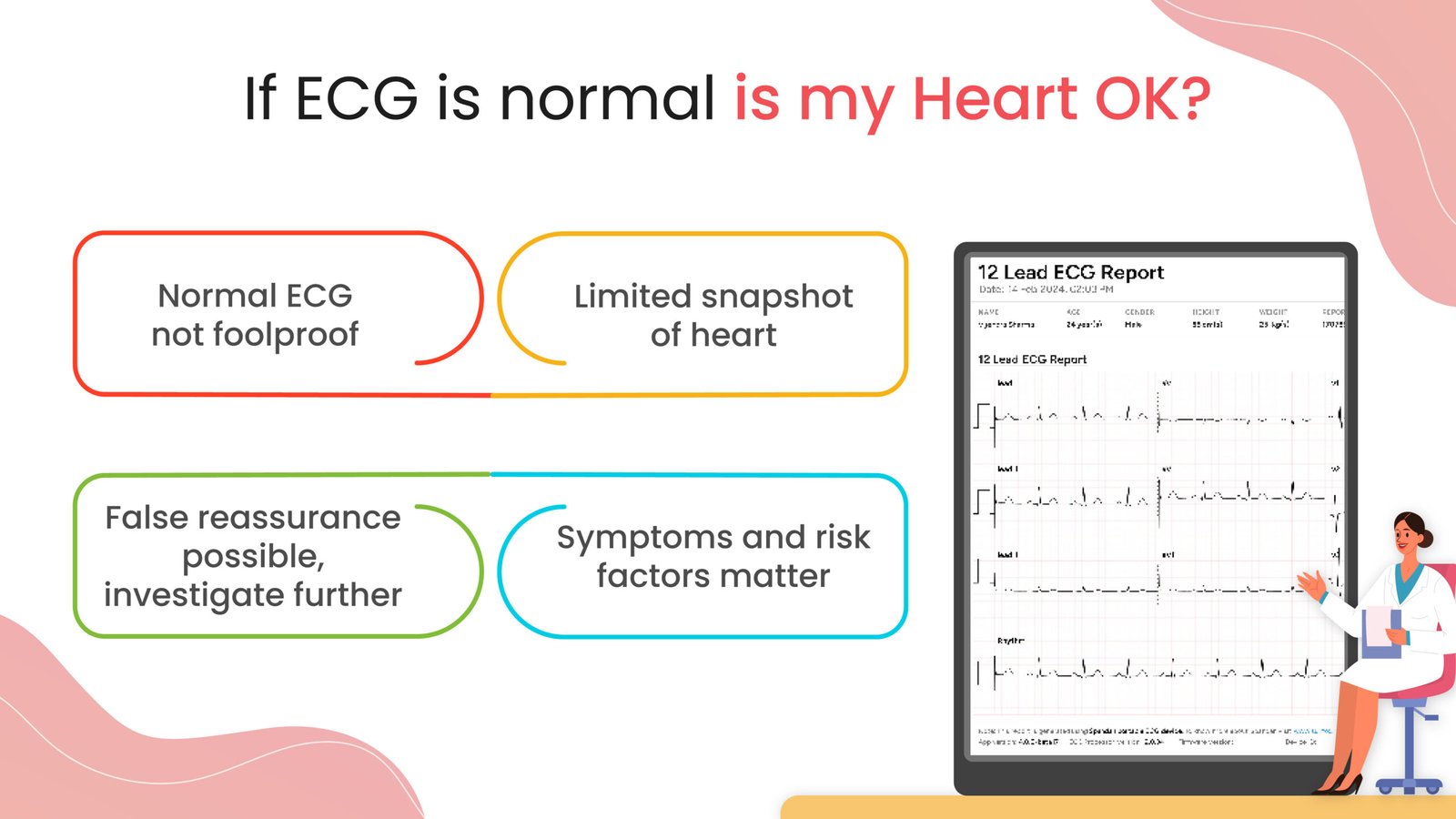
Author:- Mr. Ritesh Sharma
ECG is a highly reliable test in the realm of heart health. So, in such a scenario, one tends to think If ECG is normal is my heart OK? Well, the answer to this question is more intricate than you think. To understand the conundrum of ECG tests for your heart health, we have to delve into this topic in all of its complexities. Is getting an ECG test a complete guarantee of your optimal heart health? Or there is more to this puzzle?
In this blog, we will dive into this compelling question in the field of cardiac diagnostics and try to uncover worthy insights. So, if you have gotten your ECG test done and wondering if it is the correct way to gauge your heart health, get educated by the information covered in this blog.
What is an ECG test?
Let us first dive into the meaning of an ECG test before we examine its reliability in determining your heart’s ideal state of being. An ECG records the electrical activity of the heart over a period, typically displayed as a graph with distinct waves and intervals. These waves correspond to specific events in the cardiac cycle, offering valuable insights into heart function. An ECG consists of several components. These components include electrodes, leads, amplifiers, and a recording device.
The electrodes are placed at several parts of the body of the patient to record electrical signals from different places in the body. The signals are amplified by the amplifiers and presented in the form of waves on the recording device. This is how a typical ECG test is done.
What Constitutes a Normal ECG?
Now, we shall try to understand what constitutes a normal ECG. A normal ECG showcases a predictable pattern of electrical activity indicative of a well-functioning heart. Key features of a normal ECG include:
- P Wave: P Wave represents atrial depolarization, indicating the contraction of the atria.
- QRS Complex: QRS Complex reflects ventricular depolarization, signifying the contraction of the ventricles.
- T Wave: T Wave marks ventricular repolarization, indicating the relaxation phase of the ventricles.
- Regular Rhythm: The intervals between waves maintain consistency, reflecting a steady heartbeat.
In a normal ECG, all the aforementioned components are in harmony with each other. It showcases that the heart contains no abnormality of any kind whether they are heart palpitations or cardiac arrhythmias.
If ECG is normal is my heart OK?
Since now we know the meaning of normal ECG, the whole thing once again boils down to the question- If ECG is normal is my heart OK? The answer to this question is both yes and no. A normal ECG, the one that does not contain P-wave ECG abnormalities, QRS complex abnormalities, and T-wave abnormalities indicates a healthy heart at that specific point in time, it does not guarantee that you do not have any underlying heart conditions.
In other words, many individuals equate a normal ECG with a clean bill of cardiac health, assuming that any underlying issues would manifest as abnormalities on the electrocardiogram. While a normal ECG generally indicates the absence of significant cardiac pathology, it does not guarantee absolute cardiac wellness.
Limitations of an ECG test
Now that we have claimed that a normal ECG result does not necessarily indicate the optimal state of your cardiovascular health, we must give proper reasoning as to why that happens. For this, we are mentioning all the limitations of an ECG test below:
- Snapshot in Time: An ECG provides a snapshot of cardiac activity at a specific moment. It may not capture transient abnormalities or intermittent issues that could manifest later.
- Limited Sensitivity: Some cardiac conditions such as ventricular trigeminy may not manifest noticeable abnormalities on the ECG, especially in the early stages or if the condition primarily affects structures not directly assessed by the ECG.
- False Negatives: In certain scenarios, a seemingly normal ECG may overlook subtle abnormalities, leading to false reassurance.
Comprehensive Cardiac Evaluation Beyond an ECG Test
An ECG test can be a good indicator of heart health. However, as we mentioned above, it has multiple limitations that refrain it from becoming the only test to reassure you about your heart health. Therefore, let us now learn about several other tests that give you comprehensive insights into your heart health.
- Clinical History: A thorough assessment of symptoms, medical history, and risk factors provides valuable context for interpreting ECG findings.
- Physical Examination: Clinical signs such as murmurs, abnormal heart sounds, or peripheral edema may warrant further investigation despite a normal ECG.
- Additional Testing: Depending on clinical suspicion, further diagnostic modalities such as echocardiography, stress testing, or cardiac MRI may be warranted to elucidate underlying cardiac pathology.
Red Flags Warranting Evaluation
Despite getting a normal ECG there are some red flags in your heart health that may warrant evaluation. The following is a list of all those red flags of health:
- Chest Pain or Discomfort: Persistent or exertional chest pain warrants investigation to rule out underlying cardiac ischemia or other causes.
- Palpitations: Irregular heartbeats i.e. arrhythmia of different arrhythmia classifications, such as tachycardia and bradycardia or palpitations may necessitate further assessment to uncover arrhythmias not evident on the ECG.
- Syncope: Episodes of fainting or near-fainting warrant investigation to identify potential underlying cardiac arrhythmias or structural abnormalities.
- Risk Factors: Individuals with significant risk factors for cardiovascular disease, such as hypertension, diabetes, or a family history of cardiac conditions, should undergo comprehensive cardiac evaluation despite a normal ECG.
To summaririze the answer to question of If ECG is normal is my heart OK? No it is not necessary for your heart to be completely healthy if your ECG is normal. If you experience any heart disease symptoms even after getting a normal ECG, you must opt for a more comprehensive evaluation of your heart health.



